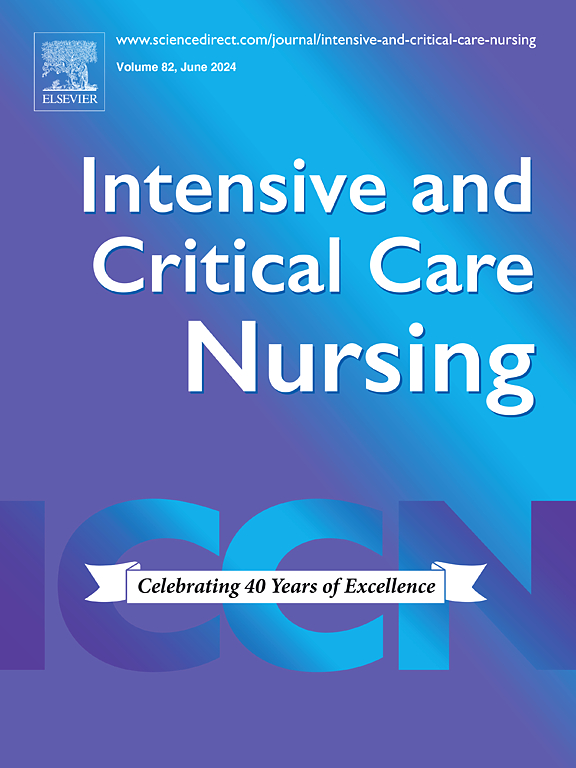Patient-psychologist telemedicine interactions in an intensive care unit recovery clinic: Qualitative secondary analysis
IF 4.9
2区 医学
Q1 NURSING
引用次数: 0
Abstract
Objectives
We aimed to describe the content of patient-psychologist mental health related dialogues during a telemedicine intensive care unit recovery clinic visit.
Research methodology/design
Qualitative descriptive study nested within a randomized controlled pilot trial to assess a telemedicine intensive care unit recovery clinic feasibility and preliminary efficacy. Participants included adults hospitalized with sepsis and/or respiratory failure. Telemedicine visits occurred at 3- and 12-weeks post-discharge involving a critical care pharmacist, physician, and psychologist. The psychologist conducted cognitive and mental health screenings, providing tailored brief psychotherapy and education. Audio-recorded visits were transcribed verbatim and underwent inductive reflexive thematic analysis.
Setting
Intensive care unit recovery clinic at an academic medical center in the southeastern United States.
Main outcome measures
N/A.
Findings
17 participants completed 31 telemedicine intensive care unit recovery clinic visits between December 2019 and March 2022. Caregivers participated in 13 visits. Participant experiences and psychologist responses were identified and separated into two overarching themes: 1) Patient-Identified Challenges and 2) Psychologist-Delivered Strategies. Patient subthemes included 1) mental health challenges (negative thoughts), 2) minimization of mental health impact, and 3) use of coping methods. Psychologist subthemes included 1) rapport building and validation 2) use of psychological assessments, and 3) psychological interventions.
Conclusion
The collaborative effort, including a psychologist, exemplifies the role of a mental health professional within the multidisciplinary intensive care unit recovery clinic team, contributing to a comprehensive approach in identifying and managing post-intensive care syndrome impairments. The focus extends to shaping compassionate care strategies for addressing mental health challenges associated with post-intensive care syndrome, fostering a holistic approach to whole-person recovery.
Implications for clinical practice
A mental health professional (e.g., psychologist, psychiatrist, psychiatric nurse practitioner) can contribute to shaping care strategies for the mental health symptoms associated with post-intensive care syndrome, fostering whole-person recovery after hospital discharge.
Clinical trial registration number
NCT03926533.
重症监护室康复诊所中患者与心理医生之间的远程医疗互动:定性二次分析。
研究目的研究方法/设计:定性描述研究嵌套于随机对照试验中,以评估远程医疗重症监护病房康复门诊的可行性和初步疗效。参与者包括因败血症和/或呼吸衰竭住院的成人。重症监护药剂师、医生和心理学家分别在出院后 3 周和 12 周进行了远程医疗访问。心理学家进行认知和心理健康筛查,提供有针对性的简短心理治疗和教育。对访谈录音进行逐字转录,并进行归纳反思式主题分析:地点:美国东南部一家学术医疗中心的重症监护室康复诊所:不详:17 名参与者在 2019 年 12 月至 2022 年 3 月期间完成了 31 次远程医疗重症监护病房恢复门诊访问。护理人员参与了 13 次探访。对参与者的经历和心理学家的回应进行了识别,并将其分为两个总体主题:1)患者确定的挑战和 2)心理学家提供的策略。患者的次主题包括:1)心理健康挑战(消极想法);2)尽量减少心理健康影响;3)使用应对方法。心理学家的次主题包括:1)建立默契和验证;2)使用心理评估;3)心理干预:包括心理学家在内的合作努力体现了心理健康专业人员在多学科重症监护病房康复门诊团队中的作用,有助于采用综合方法识别和管理重症监护后综合征的损伤。该研究的重点延伸到了为应对与重症监护后综合征相关的心理健康挑战而制定的关怀策略,促进了全人康复的整体方法:对临床实践的启示:心理健康专业人士(如心理学家、精神科医生、精神科护士)可以帮助制定护理策略,以应对与重症监护后综合征相关的心理健康症状,促进出院后的全人康复:临床试验注册号:NCT03926533。
本文章由计算机程序翻译,如有差异,请以英文原文为准。
求助全文
约1分钟内获得全文
求助全文
来源期刊

Intensive and Critical Care Nursing
NURSING-
CiteScore
6.30
自引率
15.10%
发文量
144
审稿时长
57 days
期刊介绍:
The aims of Intensive and Critical Care Nursing are to promote excellence of care of critically ill patients by specialist nurses and their professional colleagues; to provide an international and interdisciplinary forum for the publication, dissemination and exchange of research findings, experience and ideas; to develop and enhance the knowledge, skills, attitudes and creative thinking essential to good critical care nursing practice. The journal publishes reviews, updates and feature articles in addition to original papers and significant preliminary communications. Articles may deal with any part of practice including relevant clinical, research, educational, psychological and technological aspects.
 求助内容:
求助内容: 应助结果提醒方式:
应助结果提醒方式:


